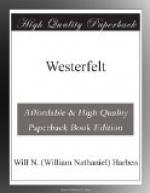“Do you think so, Mis’ Lithicum?” Mrs. Slogan retained the big smooth shuttle in her hand and eyed the speaker anxiously, her eyelids quivering.
“To be downright plain, yes, I do. Mis’ Slogan, ef she is yore sister, an’ I’ve thought many a time ’at ef I wus in yore place I wouldn’t feel safe nuther. They say a pusson sometimes gits softenin’ o’ the brain frum hatin’ folks an’ livin’ alone like she does. I’d be afeerd to leave the house open at night ef I wus you.”
“Well!” suddenly broke in Peter, who was the only one remaining at the window. “You may have my overcoat an’”—after a pause—“my best Sunday shirt, too, ef she hain’t loaded ‘er bed in that wagon an’ ‘s a-comin’ this way as big as the side of a house. She’s comin’ back heer, Clariss, Lordy, Lordy!”
They all ran to the window again and stood breathlessly watching the oncoming wagon. “She’s off ’er nut now, I know,” said Peter. “I know ’er too well; she never would come back heer ef she wus in ’er right mind.”
“Well, I don’t want to meet ’er—that’s one thing certain,” cried Mrs. Lithicum in sudden terror. “She mought pounce upon me on Lizzie’s account. I’m a-goin’ home by the path through the cotton-patch. Good day to all uv you. Ef I was you-uns,” she called back from the door, “I’d have ’er put up!”
Abner mutely followed her, and the Slogans were left to solve the problem for themselves. The wagon drew up at the door, and from their window they saw the little woman step down over the front wheel and direct the white driver—they could not hear her voice, but they read the signs of her hands—to put the few pieces of furniture on the porch. This done, the wagon clattered away, and Mrs. Dawson, with hanging head, came into the passage and went to her old room.
“What in the name o’ goodness do you reckon she’s goin’ to do?” gasped Mrs. Slogan, quite pale and cold. “I’m nearly skeerd to death.”
“She’s got a faint idee ‘at she’s goin’ to put up heer with us,” answered Peter with considerable concern for a man of his phlegmatic temperament. “They say crazy folks jest natcherly drift back into the’r old ruts, an’ the best way is to let ’em alone. Ef she kin feed ’erself we’ll be in luck; some crazy folks jest gaum the’rselves from head to foot an’ have to have constant attention.”
“But you ain’t a-goin’ to let ’er stay, are you?” cried his wife.
Peter smiled grimly and went to the mantel-piece for his foul-smelling comforter. He also pulled down from a nail on the wall a dry stalk of tobacco and proceeded to crush and crumble some of the crisp leaves in his big palm.
“Me? I don’t see ’at I’ve got a thing to say in the matter,” he retorted, with a grimace that bore a slight resemblance to a smile. “You wus tellin’ me jest t’other day ‘at the lan’ an’ house wus in yore name an’ her’n, an’ ’at I had no right to put in. I reckon you’ll have to manage ’er, Clariss.”




